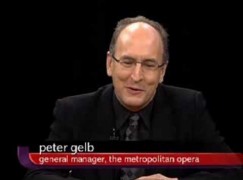Worst news: Union says Met lockout is now ‘virtually certain’
mainThere’s a fortnight to go to deadline day, but the stage unions see no realistic possibility of agreement with Peter Gelb. Here’s what they reported overnight.

To: AGMA-represented principal artists
From: Alan Gordon
Re: Update on Met Negotiations
Sadly, I have to report to you that recent developments at the Met make it a virtual certainty that Peter Gelb will lock out all of the Met’s performers, instrumentalists, stagehands and other performers on or after August 1st. In turn, the eventual result will likely be the cancellation of all Met performances throughout 2014, and possibly for the entire season, and perhaps beyond.
The first such development is the appearance that Gelb is conducting the upcoming negotiations with ever-increasing reliance upon the strategy and tactics of his anti-union, $1000 an hour lawyer Harold Robbins. Robbins, a partner in the giant Proskauer, Rose, Goetz and Mendelsohn pro-management law firm is known for advising employers who lock out workers to bully them into submission.
The second development is the direct involvement of the Met’s Board of Directors into the negotiating process. They recently bought a full page ad in the NY Times, supporting Gelb generally, and specifically endorsing some of his proposals that would completely restructure, negatively, the way in which performers would get paid. With the Board’s unlimited money in support of Gelb’s lockout plan, there seems to be little likelihood that Gelb has any reason to take a more reasonable bargaining position. It’s bizarre that the Met’s patrons, who theoretically love opera and who fund much of it, are also so determined to hurt the people who are the opera.
The third development is the observable pattern of pre-negotiation bad faith conduct in which Gelb is engaging, all in violation of the National Labor Relations Act. That conduct combines 1) an obvious intention to do what’s known as illegal surface bargaining: Going through the motions of bargaining without ever intending to reach an agreement and 2) Committing multiple unfair labor practices, including refusing to agree upon a neutral site for negotiations, denying the press (and the public) access to negotiations so he can hide what he’s doing from public scrutiny, refusing to agree upon any version of the last collective bargaining agreement, refusing to provide legally required information about the Met’s finances and illegally dealing directly with employees.
Although Gelb has told your agents that it isn’t true, if he succeeds in gaining an overall reduction of 17-25% in the compensation of the Met’s regular employees through a lockout, it is an obvious certainty that he will unilaterally impose a 17-25% reductions in your fees, with your agents suffering a corresponding loss, reductions you will be forced to accept if you want to sing at the Met.
Gelb, having found himself unable to actually handle labor negotiations and unable to take the relentless criticism of his failed artistic and business plans in the press and from his employees, has taken refuge behind lawyers who have no stake in the outcome of the negotiations. Unlike Joseph Volpe, who cared for both the Met and its performers, Gelb cares only about perpetuating his legacy of waste and excess, justifying his out-of-control expenditures and making sure that the Met’s Board does nothing to impair his massive salary and $3 million dollar supplemental pension.
With these developments, a Gelb-imposed lockout is a virtual certainty.
The harm that this will cause to the lives of thousands of people, families and children is exacerbated by the fact that Gelb simply doesn’t seem to understand the real effect of a lockout on the Met. Being a complete rookie at labor relations, and guided by Robbins, Gelb believes that a short lockout will bring the employees to their knees. Robbins knows better, but apparently won’t tell Gelb, that once locked out even for a day, the unified performers will be forced to keep the Met dark for the rest of 2014, if not beyond.
In response to Gelb’s violations of federal labor law, AGMA today filed multi-count unfair labor practices charges against the Met with the National Labor Relations Board. If the NLRB ultimately determines that the lockout was undertaken in furtherance of unfair labor practices, employees (you) would be entitled to me ‘made whole’ (i.e., paid back for money lost).
Across-the-table negotiations are scheduled to begin the last week in July.
No one…the singers, instrumentalists, administrative staff, other performers or the unions that represent them…doubts that the has grossly overdrawn from its endowment, and is suffering from the uncontrolled costs of Peter Gelb’s failed plans. It’s clear to all that his spending needs to be controlled, or he needs to be replaced.
If the Met’s Board of Directors doesn’t either replace him, or exert real control over his exorbitant spending, trying to ‘save the Met’ is going to be a fool’s errand. Gelb’s legacy has been one marked by waste, excess and extravagance, a failed artistic vision and a box office in freefall, which no one who loves the Met wants to perpetuate.
Against that background, even if Gelb achieved the 17-25% cuts he seeks from the performers, two years into the future the Met would again be back where it is now, asking for more cuts.
It would be easy, but wrong, to blame Gelb alone. The real villains are the members of the Met’s Board of Directors who, despite their supposed business and financial acumen, have failed (or refused) to accept the true state of facts: The Met is being seriously mismanaged and it was their job to prevent that mismanagement. Now, it’s their job to fix it. It’s their fiduciary duty to control Gelb, to oversee the Met’s operations, to protect its artistic integrity and to guard its future. And to protect the well-being of the performers who create its ‘product’.
The fundamental tenets of Gelb’s strategy, effectively unsupervised still by the Board, have been for the Met to increase attendance by drawing a new and younger audience through new productions and HD theatercasts. The available data, however, indicates that the opposite has occurred. Attendance has declined and the trend continues. In fact, it appears that many of the new productions have drawn even smaller audiences than those they replaced. The strongest element of attendance is the exceptional seat sales of the repeatedly popular “old warhorses”. Beyond that, however, are the resultant (and un-recouped through ticket sales) costs for so many new productions: Massive overtime expenses caused by the additional rehearsals that are necessitated by inept scheduling, ever escalating construction costs for new sets and Gelb’s complete failure (and stated unwillingness) to control unnecessary directorial-driven expenditures and squander.
Likewise, the HD movie theater strategy has similarly failed and has not significantly increased the bottom line. Worse, it has cannibalized of NY opera goers out of the opera house into movie theaters.
There seems little doubt that the major reason underpinning the Met’s current and growing predicament are management failures in strategy, planning and execution. Although Mr. Gelb’s predecessor was criticized for his artistic judgments, that criticism was demonstrably not shared by ticket buyers and, it should be remembered, that he left the Met in relatively good financial position, with much higher attendance and with 20 years of labor-management peace. Unfortunately, the Met under Gelb can’t survive as we know it unless significant management changes take place.
The crucial role of the Board of Directors, in exercising control over run away management has been too long delayed. None could deny the abysmal role played by the Board of the New York City Opera in its demise and yet there is little indication that the Met’s Board is taking a different, strong role. Or an effective role. Or any role. Left alone by the Board, Gelb has, instead, managed by surrounding himself with sycophants who, to protect their own jobs, will not tell the Emperor that he ‘has no clothes’.
The Met is at the point where its future viability hangs in the balance. If the Board directs Gelb to abandon his failed business strategy, limit the number of new productions, black out HD broadcasts in New York, eliminate waste and undertake a closely supervised management, the Met can regain its strength. Or the Board could (and often it’s now heard as ‘should’) empower a new manager to do it. If Gelb’s plans continue as is, however, failure and a lockout are the obvious, unavoidable, and unacceptable outcomes.
We continue to do everything possible to force Gelb into honest, legal, bargaining. Hard bargaining is no problem for us. Gelb’s surface bargaining and his lockout are going to hurt a lot of people and their families.





Comments